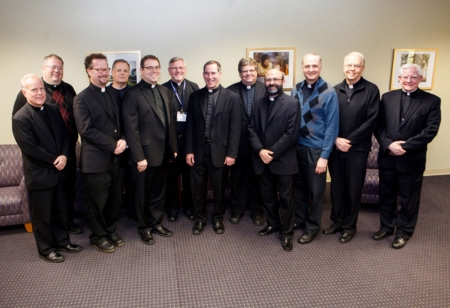Pastors of Phase 1 collaborative parishes begin training
BRAINTREE -- To support the first phase of the Archdiocese of Boston's new pastoral plan, a vanguard of 12 pastors of collaborative parishes met in May to discuss the knowledge and to train in skills necessary to begin their new ministries in June as part of the new evangelization.
The Office of Pastoral Planning linked the mission of the new evangelization with practical development and leadership skills at a training session, May 7-10, for the 12 pastors. The training opened a larger program set to continue later in the month for first-phase collaborative parish pastors.
Father Paul Soper, director of the Office of Pastoral Planning, and Michael M. Lavigne, senior associate to the Episcopal Vicar for the New Evangelization, described the specifics of the sessions in an interview on May 9.
Father Soper said "Disciples in Mission: A Pastoral Plan for the Archdiocese of Boston" called for training run in stages to help collaborative parishes establish themselves.
"This is the second stage of the training for phase one. The 12 pastors of the 12 phase one collaboratives are here for eight days, four days now and four days at the end of the month, in order to kick off that training," Father Soper said.
Sessions included talks and training on theology in practice of the new evangelization, Catholic leadership and topics related to ministry of collaborative parishes.
The training program presented the new pastors with a look at how collaborative parishes work by using information gathered at actual collaborative parishes as part of the plan.
"Day one was really a lot of foundational presentations. So, for example, we had a presentation on what is the new evangelization? What is our role? What are some practical ways of living it out in parishes?" Lavigne said.
He said discussion and training focused on moving forward in identifying needs to sustain ministry in collaborative parishes.
"They have a lot of information at their disposal and a lot of staff from the Pastoral Center dedicated to serving them, not just for this training, but beyond ... and really helping them to navigate the waters in this first phase of Disciples in Mission," Lavigne said.
Organizers said the training sessions included scenario simulations using true-to-life data specific to collaborative parishes in the archdiocese. As part of the training, pastors discussed the information related to collaborative parishes, to get a feel for the realities of their future ministry.
In a simulation, pastors divided into three working groups. Each group looked at one set of collaborative parishes to discuss and study the factors necessary for the parishes to become centers for the new evangelization. Pastoral planning trainers assigned pastors to collaborative parishes other than their upcoming assignments for the simulation.
During the simulation, pastors interacted with the Collaborative Support Team, a group instituted as part of the pastoral plan to funnel information and support from the archdiocese to collaborative parish pastors and their pastoral teams.
As the pastors developed familiarity with specific realities of collaborative parish ministry, members of the Collaborative Support Team developed familiarity with the pastors and how best to provide them with support.
"Those relationships are developing. It is as much training for the Collaborative Support Team in supporting the pastors as it is training for the pastors themselves," Father Soper said.
Father Soper said training in the next session will focus on the collaborative parishes where pastors are assigned, so they can prepare to address the needs of those parishes based on the foundation of knowledge built in the last session.
Father Paul Ritt, assigned to collaborative parishes in Lynnfield, talked about the value of the training for him as he prepares to serve Our Lady of the Assumption and St. Maria Goretti.
"Being with my brother priests, all of whom are going to be pastors in collaboratives, I have benefited from their insights, from the wisdom they have gained through the years in their own respective pastoring. We have shared ideas. We have had good leadership, good guidance from the Catholic Leadership Institute folks who are here," he said.
He said the most helpful segments of training were the simulations, and that he was impressed by the amount of information made available.
"We had loads of information given to us in huge binders. The staff here at the pastoral center has put together an incredible amount of information on the respective collaboratives, the parishes. They have given us great data. With the help of the data and the binders and the wisdom of the resource people here, we have been able to look at the needs, the demands, of these new collaboratives, the resources that we have, the issues that we are going to need to address fairly soon," Father Ritt said.
Father Bill Dickinson, vice-president of ministry development and episcopal services at the Catholic Leadership Institute based in Pennsylvania, said the vision asserted by Cardinal Seán P. O'Malley in the pastoral plan and executed by the Office of Pastoral Planning at the training could be replicated for other dioceses on a national scale.
The national apostolate partnered with the archdiocese to facilitate the training as a consultant and support structure for the trainers, coordinators and pastors at the May training.
"My role here is to provide leadership training and support to these 12 pastors who will be pioneers in these first 12 collaboratives as the cardinal pursues the new evangelization here," Father Dickinson said.



















